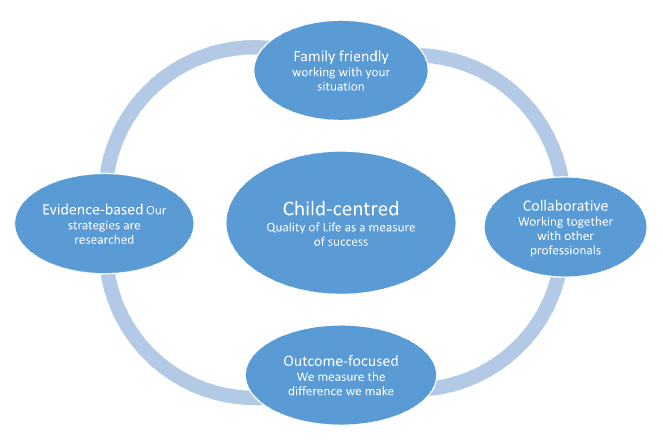How Our Programmes Help Your Child
Our unique programmes can help children build their skills and manage their own behaviour more effectively.
What does a typical Child Autism Programme look like?
Child Autism UK’s clinical team uses modern behavioural techniques based on the latest data-backed science. This approach allows us to develop tailored strategies and approaches that help them achieve their goals.
Our programmes are child-centred, fun and inspiring.
You can find more information about our approach and some of the techniques we use HERE.
How our programmes work

- Our case managers will assess your child’s strengths and learning needs to determine where we can help improve the quality of life for your child and the wider family.
- We then train and support everyone involved in your child’s life to provide and encourage a consistent approach to developing the skills that will help them achieve their goals.
- We usually recommend starting the programme at home so your child can become confident with their new skills. We can then help your child transfer these skills to more challenging environments, such as a nursery or school.
Our programmes have two main goals:
- Building skills: We help build on your child’s strengths, emphasising communication, social interaction, and play skills. We also support other key areas of development, such as independence, daily living skills and learning skills.
- Behaviour management: We help your child learn how to replace behaviours that are affecting quality of life (both of the child and the wider family) with alternatives that serve the same goal. Behaviours are prioritised according to how much they affect your child’s quality of life.
A fictional example of skill building: Tommy always spent his playtime at school walking around the outskirts of the playground. Using tools based on behaviour analysis, such as shaping, prompting, modelling and generalising, Tommy learnt to play more games. He started playing with one child. Next, he joined a small, quiet group. Then he transferred these skills to the playground. Using prompts and reinforcement, Tommy discovered he enjoyed these games and chose to join in without adult intervention.
A fictional example of behaviour management: Sanjay started throwing objects in class. Using functional analysis, a technique based on behaviour analysis, it was discovered that Sanjay behaved this way because he wanted a break from an environment he found over-stimulating and overwhelming. Sanjay was taught how to request a break differently. When he felt overwhelmed, he would hold up a ‘break’ card. His teacher would then let him run around the playground and calm himself down. Proactive strategies were also put in place to reduce environmental stimulation. Calmer colours were used on the walls in front of Sanjay, and the school bell was made quieter.
What do our programmes offer?
Improved quality of life: Our main priority is making life better for a child and their family.
Family involvement: Our programmes work best when the whole family is involved.
Data-driven decision making: A child’s targets and goals are tracked daily on an online system so issues can be quickly resolved and parents can monitor progress.
Evidence-based strategies: Our trained clinical staff run regular workshops to review data, problem solve, and develop the most effective learning tools for your child
One-to-one support: We prioritise one-to-one support. The number of hours a child receives each week will depend on the number of skills being taught and their age.
Regular practice: Clinical research shows that the more skills are practised, the better they will be retained.
Generalisation of skills: We help teach skills that a child can use with different people in a range of environments. Generalisation also helps to reduce the level of one-to-one support needed until a child becomes independent.
Early intervention: Research shows that early intervention helps children reach their potential. We work with children from pre-school up to the end of primary school. We can work with children as young as 18 months — the earlier, the better, but it’s never too late to start.
Why choose us?
We use a very individualised approach.
Child Autism UK case managers use a wide range of strategies. Some children respond well to more structured teaching, and others to more incidental teaching. Most children require a balance so they can use their skills in different situations.
We offer flexibility around your child’s needs.
Our case managers assess each child’s individual needs before making recommendations. We believe our approach should be based on scientific principles and that decisions should be made using the best available data and evidence.
We’re experienced behaviour specialists.
Our case managers have extensive experience in the field. They all hold a Master’s Degree and are all qualified BCBA (Board Certified Behaviour Analysts) and UKBA (certs). They can tailor teaching styles to your child’s strengths and develop specific solutions to overcome obstacles to progress. Our case managers are supervised by our clinical manager. They receive external and in-house training on the latest developments in the field – enabling them to create a valuable support network for your child.
Our services for families
We can provide support and guidance on the Education, Health and Care (EHC) Plan process.






